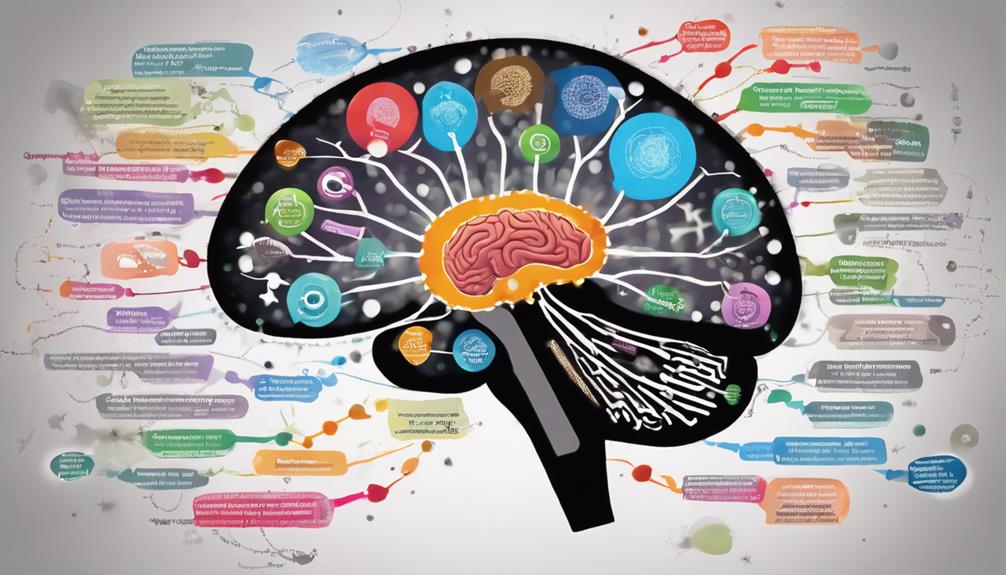The effectiveness of subliminal hypnosis techniques varies due to individual differences in suggestibility, cognitive styles, and openness, impacting how individuals respond to subconscious messages during hypnosis. Factors such as hypnotic susceptibility, emotional regulation, and cognitive response play crucial roles in determining the outcomes of hypnosis interventions. Environmental influences, hypnotist skill, and brain activity during hypnosis further contribute to the variability in effectiveness. Understanding these multifaceted components can lead to tailored approaches that optimize the results of hypnosis sessions. Exploring the intricate interplay of these factors can provide deeper insights into enhancing the effectiveness of subliminal hypnosis techniques.
Research on Subliminal Hypnosis Effectiveness

The efficacy of subliminal hypnosis techniques in inducing behavioral changes has been a subject of interest in various scientific studies. Subliminal messaging involves the presentation of stimuli below the threshold of conscious awareness, aiming to influence individuals' subconscious reactions.
When combined with hypnosis techniques, such as guided imagery or relaxation exercises, subliminal messages can potentially tap into the subconscious mind to bring about behavioral modifications.
Research in this area has shown that the effectiveness of subliminal hypnosis techniques can vary among individuals due to factors such as individual differences in suggestibility, cognitive styles, and openness to new experiences. Some individuals may be more responsive to subliminal messages during hypnosis sessions, leading to more pronounced behavioral changes, while others may exhibit minimal responses.
Understanding these individual differences is crucial in tailoring hypnosis interventions to maximize their effectiveness for each person.
Factors Influencing Hypnosis Results
Factors influencing the outcomes of hypnosis sessions encompass a range of individual characteristics and environmental variables that can interact to shape the effectiveness of the intervention.
Individual differences play a significant role in determining the success of hypnosis. Hypnotic susceptibility, which varies among individuals, influences how receptive a person is to hypnotic suggestions. Those with higher hypnotic susceptibility may experience more profound effects from hypnosis compared to those with lower susceptibility levels.
Environmental factors also play a crucial role in determining the outcomes of hypnosis. The extent to which an individual accepts suggestions during a hypnosis session can be influenced by the environment in which the session takes place. Factors such as the presence of distractions, the comfort level of the individual, and the skill of the hypnotist can all impact suggestion acceptance and, consequently, the effectiveness of the hypnosis session.
Understanding and considering these individual differences and environmental factors are essential in optimizing the outcomes of hypnosis interventions. By tailoring the approach to account for these influencing variables, hypnosis practitioners can enhance the overall effectiveness of the technique.
Cognitive and Emotional Response Impact

Cognitive and emotional responses significantly influence the effectiveness of hypnosis techniques. Emotional regulation plays a crucial role in how individuals respond to subliminal hypnosis. Those with better emotional regulation may find it easier to enter a hypnotic state and be more receptive to suggestions. On the other hand, individuals struggling with emotional regulation may have difficulty reaching the desired hypnotic state, impacting the overall effectiveness of the technique.
Moreover, cognitive enhancement through hypnosis can also influence its effectiveness. Techniques that aim to enhance cognitive functions such as focus, memory, and problem-solving skills can be more effective when individuals exhibit a positive cognitive response to the hypnosis. This positive response may lead to better engagement with the hypnotic process and a higher likelihood of desired outcomes.
Neurological Processes and Hypnosis
Neurological processes play a fundamental role in the mechanisms underlying the phenomenon of hypnosis. When an individual is under hypnosis, there are observable changes in brain activity that correlate with responses to hypnotic suggestion.
Studies using imaging techniques such as functional magnetic resonance imaging (fMRI) have shown alterations in brain regions associated with attention, control, and the processing of sensory information during hypnosis. These changes suggest that hypnosis involves a state of focused attention and heightened suggestibility, where the brain becomes more receptive to external cues and directions.
Hypnotic suggestion, a key component of hypnosis, influences these neurological processes by guiding the individual's perception, cognition, and behavior. The power of suggestion in hypnosis can modulate neural pathways involved in decision-making, memory retrieval, and emotional responses.
Subliminal Messaging and Perception

The exploration of subliminal messaging in relation to perception involves investigating subtle stimuli that can influence individuals' cognitive processing without their conscious awareness.
Subconscious processing plays a significant role in how sensory stimuli are perceived and integrated into an individual's cognitive framework. Research suggests that individual susceptibility to subliminal messaging can vary based on factors such as personality traits, past experiences, and cognitive biases.
Furthermore, environmental factors can also impact how subliminal messages are perceived, with elements like cultural background, social conditioning, and emotional state playing a role in the effectiveness of such techniques.
Understanding the interplay between subconscious processing, sensory stimuli, individual susceptibility, and environmental factors is crucial in comprehending the mechanisms behind subliminal messaging and its potential influence on perception.
Future studies may delve deeper into these factors to elucidate the complexities of subliminal messaging and its implications for cognitive processing.
Practical Applications and Recommendations
Practical applications of subliminal hypnosis techniques involve subtle interventions aimed at influencing behavior or cognition without conscious awareness. To maximize the effectiveness of these techniques, a personalized approach is crucial. Tailoring suggestions to individual preferences, beliefs, and goals can enhance receptivity to the subliminal messages.
Consistent practice plays a significant role in reinforcing the desired changes. By incorporating positive reinforcement techniques, such as affirmations or visualizations, individuals can strengthen the impact of subliminal hypnosis over time.
Recommendations for utilizing subliminal hypnosis techniques include creating a conducive environment free from distractions, where individuals can relax and focus on receiving the messages. It is also advisable to use high-quality recordings or scripts that are specific to the desired outcome.
Regular practice, ideally daily or as recommended, can help embed the suggestions into the subconscious mind more effectively. Monitoring progress and adjusting the approach as needed based on individual responses are essential for long-term success with subliminal hypnosis.
Frequently Asked Questions
Are There Any Risks or Side Effects Associated With Subliminal Hypnosis Techniques?
Potential risks and side effects of subliminal hypnosis techniques include unintended psychological impacts and misinformation. Safety precautions involve using reputable sources and professional guidance. Effectiveness factors vary, making comparison studies essential for understanding individual responses and outcomes.
How Long Does It Typically Take to See Results From Subliminal Hypnosis?
The timeline to observe results from subliminal hypnosis varies among individuals. While some may experience immediate effects, long-term results typically require consistent practice over several weeks. Individual response plays a significant role in determining the efficacy of these techniques.
Can Subliminal Hypnosis Be Used to Treat Specific Mental Health Conditions?
Clinical applications of subliminal hypnosis for specific mental health conditions have been explored in research studies. Efficacy varies among conditions with limitations due to individual differences. Further investigation is warranted to determine its full potential.
Are There Differences in Effectiveness Between Audio and Visual Subliminal Techniques?
When comparing audio vs visual subliminal techniques, effectiveness can vary due to individual differences in sensory processing and suggestibility. Research suggests that both modalities can be effective, but outcomes may depend on factors such as personal preference and cognitive style.
Are There Any Ethical Considerations to Keep in Mind When Using Subliminal Hypnosis?
When using subliminal hypnosis, ethical considerations are paramount due to the potential for subconscious manipulation. Practitioners must ensure transparency, informed consent, and respect for individual autonomy. Upholding ethical standards is essential in safeguarding the well-being of participants.
Conclusion
In conclusion, the effectiveness of subliminal hypnosis techniques varies due to a combination of factors such as individual cognitive and emotional responses, neurological processes, and perception of subliminal messaging.
Further research is needed to understand the intricate mechanisms behind hypnosis and to develop more targeted and effective techniques for achieving desired outcomes.
It is imperative for practitioners to consider these factors in order to optimize the effectiveness of subliminal hypnosis interventions.
